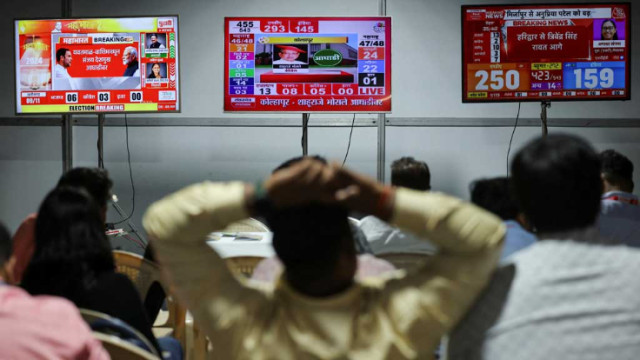Indian Prime Minister, Narendra Modi's alliance was winning a majority of seats in early vote counting trends in the general election on Tuesday, but a fall is predicted in exit polls, TV channels showed.
The trends spooked financial markets which had expected a hefty win for Modi, with stocks falling steeply.
The blue-chip NIFTY 50 (.NSEI), opens new tab was down 5.5% and the S&P BSE Sensex (.BSESN), opens new tab was down 5.3% at 0800 GMT, making the repee fell sharply against the dollar and the benchmark bond yields were up.
The markets had soared on Monday after exit polls on June 1 projected Modi and his Hindu nationalist Bharatiya Janata Party (BJP) would register a big victory, and its National Democratic Alliance (NDA) was seen getting a two-thirds majority and more.
At 0800 GMT, TV channels showed the NDA was ahead in nearly 300 of the 543 elective seats in parliament, where 272 is a simple majority.
The opposition INDIA alliance led by Rahul Gandhi's centrist Congress party was leading in over 220 seats, higher than expected.
BJP accounted for nearly 240 of the seats in which the NDA was leading, short of a majority on its own, compared to the 303 it won in 2019.
A third Modi term with a slim majority for BJP - or having to depend on NDA allies for a majority - could introduce some uncertainty into governance as Modi has ruled with an authoritative hold over the government in the last decade.
However, politicians and analysts said it was too early to get a firm idea of the voting trends since a majority of ballots were yet to be counted.
For BJP spokesperson, Nalin Kohli "It's a fair assessment to say 400 seats to the NDA at the moment certainly looks distant.
"But we need to wait...to have a final picture of the seats because the exit polls speak of a massive sweep, (and) the counting trends currently don't seem to match that," he said.
"The BJP-NDA will form the government, that trend is very clear from the start," he added.
The exit polls broadcast after voting ended on June 1 projected a big win for Modi, but exit polls have often got election outcomes wrong in India.
Nearly one billion people were registered to vote, of which 642 million turned out.
However, if Modi's victory is confirmed even by a slim margin, his BJP will have triumphed in a vitriolic campaign in which parties accused each other of religious bias and of posing a threat to sections of the population.
Investors had cheered the prospects of another Modi term, expecting it to deliver further years of strong economic growth and pro-business reforms, while the anticipated two-thirds majority in parliament would allow major changes to the constitution.
AFP
Modi, 73, who first swept to power in 2014 by promising growth and change, is seeking to be only the second prime minister after India's independence leader Jawaharlal Nehru to win three straight terms.
He began his campaign by showcasing his record in office including economic growth, welfare policies, national pride, Hindu nationalism and his own personal commitment to fulfilling promises which he called "Modi's Guarantee".




















